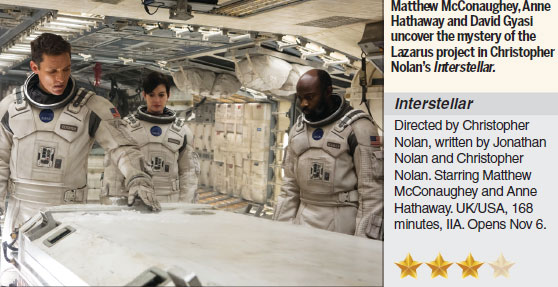American hero's space odyssey
Updated: 2014-11-07 07:54
By Elizabeth Kerr in Hong Kong(HK Edition)
|
|||||||||
For the record, that three-star rating isn't because Christopher Nolan's latest magnum opus is near-perfect. Even though a great deal of the film is flawless, it frequently falls flat on its face. Nolan's ambition in reaching for something truly awe-inspiring, which occasionally exceeds his grasp, deserves three stars.
If you go into Interstellar believing it's going to be spectacular, it will be. But the epic space adventure rooted in scientific realism (based on Kip Thorne's theoretical physics) and family drama is all kinds of frustrating for its inability to commit to any one thing.
Nolan has been criticized for his non-emotionalism, and in Interstellar he tries to correct that. With help from co-writer and brother Jonathan (who spearheads television's best sci-fi drama, Person of Interest), the filter for Nolan's old-fashioned space-time odyssey is an intimate story about a girl and her father. Unsurprisingly, that's the film's weak link.
Interstellar's plot is simple. Earth's near future is blighted and we are dying. Former pilot, engineer and reluctant farmer Cooper (Matthew McConaughey) instills a sense of otherworldly wonder in his kids despite popular revisionism (what moon landing?). One evening Cooper stumbles upon the remains of NASA, led by legendary Professor Brand (Michael Caine). He's promptly recruited into the last-ditch plan to find a new home on one of three planets on the other side of a wormhole near Saturn. Cooper, Brand's daughter Amelia (Anne Hathaway), Doyle (Wes Bentley), Romilly (David Gyasi) and a brilliant robot, TARS (scene-stealer Bill Irwin) head out on the Endurance to finish what the previous, mysteriously silent, Lazarus expedition started.
Though at various times channeling Event Horizon, The Abyss, and Contact, Interstellar could also be held up against last year's Gravity for its pro-explorationism and scope and, yes, Guardians of the Galaxy for its optimistic, gleeful galaxy questing. The latter films had an abundance of what the dead serious Interstellar (and most of Nolan's works) lacks: a resonant humanism that connects viewer to character. Gravity and Galaxy were emotional and genuine rather than just brainy or fun and it made for a more fulfilling space opera experience.
Interstellar is alternately a family weeper, a sci-fi thriller and a trippy, pseudo-sixties meditation on man's relationship to the universe. At nearly three hours, each gets its turn, but only two need to be here. Cooper is a classical American hero (a first for Nolan), sacrificing his family for the needs of humanity but his decision to leave them and save the world seems as tortured as choosing between fries and side salad. It's the kind of sentimentality the film's alleged first director, Steven Spielberg, can handle in his sleep. Things fray at the edges whenever Cooper's grown daughter (special relativity!) Murph (Jessica Chastain) contemplates the loss of her dad or Amelia theorizes about the role of love in physics (saddling Hathaway with the film's worst monologue).
Nolan is ice cold but he remains one of the industry's most dazzling technicians. The film reaches its greatest heights when the Endurance floats past Saturn, or when a hostile environment scuttles a mission, or during a white-knuckled docking attempt. Shot in immersive IMAX with production design by Nolan regular Nathan Crowley, there isn't a visual moment that's less than breathtaking. Despite plot threads that unravel the narrative if you pull too hard, by the time the psychedelic coda rolls around you've either fallen under Interstellar's considerable sway (and Hans Zimmer's mesmerizing organ score) or stormed out. In another typical Nolan-ism there is no middle ground.

(HK Edition 11/07/2014 page7)